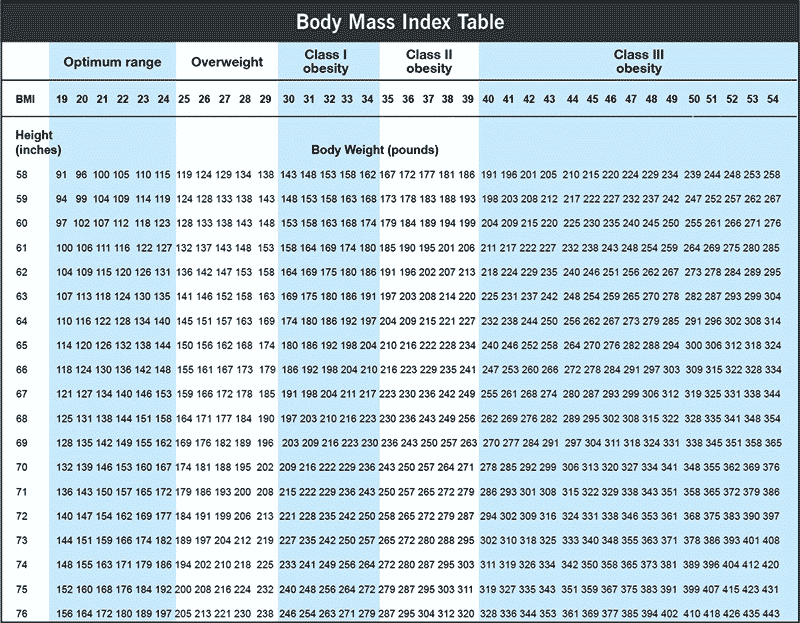Body mass index (BMI) is a tool that healthcare providers use to estimate the amount of body fat by using your height and weight measurements. It can help assess risk factors for certain health conditions. The BMI isn’t always an accurate representation of body fatness.
Advertisement
Cleveland Clinic is a non-profit academic medical center. Advertising on our site helps support our mission. We do not endorse non-Cleveland Clinic products or services. Policy
Body mass index (BMI) is a medical screening tool that measures the ratio of your height to your weight to estimate the amount of body fat you have. Healthcare providers calculate BMI by using weight in kilograms (kg) divided by the square of height in meters (m2).
Advertisement
Cleveland Clinic is a non-profit academic medical center. Advertising on our site helps support our mission. We do not endorse non-Cleveland Clinic products or services. Policy
In most people, BMI correlates to body fat — the higher the number, the more body fat you may have — but it’s not accurate in some cases. BMI alone doesn’t diagnose health. Healthcare providers use BMI and other tools and tests to assess someone’s health status and risks.
High body fat may lead to heart disease, stroke and Type 2 diabetes. Low body fat may be related to malnutrition. Just the right amount of body fat helps vitamins and minerals get into your body. It also provides a source of energy for your body, helps maintain body temperature and protects your organs.
You shouldn’t use the standard BMI chart to evaluate a child’s or teenager’s weight. Talk to your child’s healthcare provider about the optimum weight range for their age and height.

Image content: This image is available to view online.
View image online (https://my.clevelandclinic.org/-/scassets/images/org/health/articles/9464-body-mass-index-bmi.ashx)
Healthcare providers use BMI to help diagnose weight types and as a screening tool for certain health conditions.
In general, the following BMI ranges (in kg/m2) classify different weight types:
BMI isn’t the only tool providers use to classify weight types. Other tools include:
Advertisement
If you have a BMI less than 18.5 (underweight), you may be at a higher risk for developing the following conditions:
If you have underweight, your healthcare provider will likely order certain blood tests and other tests to check your overall health and to see if you’re malnourished.
In general, the higher your BMI, the higher your risk for the following conditions:
It’s important to remember that you could have any of the above health conditions without having a high BMI. Similarly, you could have a high BMI without having any of these conditions. Genetics and other factors, such as smoking cigarettes, play a large role in the development of these conditions.
If your BMI reveals you may have obesity, your provider will likely order certain blood tests to check your general health, such as a comprehensive metabolic panel and lipid panel.
You can calculate BMI yourself with these steps:
For example, a person who weighs 180 lbs. and is 5 feet and 5 inches tall (65 inches total) would calculate their BMI in the following way:
Their BMI would be 29.9.
The optimum range for a healthy BMI is considered to be 18.5 to 24.9.
It’s important to remember that body fatness isn’t the only determiner of overall health. Several other factors, such as genetics, activity level, smoking cigarettes or using tobacco, drinking alcohol and mental health conditions all affect your overall health and your likelihood of developing certain medical conditions.
The standard BMI chart has limitations for various reasons. Because of this, it’s important to not put too much emphasis on your BMI.
Even though the BMI chart can be inaccurate for certain people, healthcare providers still use it because it’s the quickest tool for assessing a person’s estimated body fat amount.
Advertisement
The standard BMI has limitations in regards to diagnosing weight types, including:
You shouldn’t use the standard BMI chart to assess the amount of body fat of the following populations:
The BMI as a screening tool for assessing the risk of certain health conditions, such as Type 2 diabetes and heart disease, has some limitations, including:
Advertisement
Body mass index (BMI) is a quick tool that healthcare providers can use to assess your risk for certain health conditions. However, BMI isn’t always an accurate measurement of body fatness and isn’t the sole determiner of your general health. If you have any questions or concerns about your weight or your risk for developing certain health conditions, such as heart disease, talk to your healthcare provider. They’re available to help.
Advertisement

Sign up for our Health Essentials emails for expert guidance on nutrition, fitness, sleep, skin care and more.
Learn more about the Health Library and our editorial process.
Cleveland Clinic’s health articles are based on evidence-backed information and review by medical professionals to ensure accuracy, reliability and up-to-date clinical standards.
Cleveland Clinic’s health articles are based on evidence-backed information and review by medical professionals to ensure accuracy, reliability and up-to-date clinical standards.
If you have obesity and losing weight is an uphill battle, Cleveland Clinic experts can help you decide if bariatric surgery is an option.
